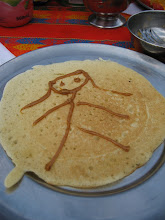Releasing our Inner Critics
Book Review on The Samurai’s Garden by Gail Tsukiyama
I was all prepared to love The Samurai’s Garden because Gail Tsukiyama had come to our college in the Spring of 2005 and I found her to be a lovely person. Down-to-earth and articulate, she talked about her writing process for creating this book as well as her other best seller Women of the Silk. Other instructor I knew had used the book in their classes and thus, it was with the highest of expectations that I begin the book.
The Samurai’s Garden takes place during World War II, after the rape of Nanking and while Japanese forces were marching in to take over China. The main character, Stephen, the son of a wealthy Chinese businessman working in Japan, has contracted tuberculosis and has been sent to his family’s seaside cottage. There in Tarumi, as his body recuperates from the disease, he is befriended by Matsu, the reticent and pragmatic caretaker of his father’s estate. Through him, Stephen meets Sachi, a beautiful woman whose life has been marred by disease and now lives in a leper colony. Both Matsu and Sachi teach Stephen about the dignity and beauty that can be found in a life which is interrupted, yet perseveres. In the meanwhile, he has his own romance with a local girl, Keiko, whose brother serves in the Japanese Imperial Garden. At the end of the story, Stephen leaves Tarumi stronger in both body and soul, and wiser.
Although the story had so many potentially rich and interesting characters and plot possibilities, overall I found the story to be contrived and the characters flat. The Samurai’s Garden feels dreamlike in many ways because Stephen leaves his everyday life for this sleepy seaside hamlet. But the situations and people he encounters and the ways that he reacts to them does not ring true for me. For instance, the love triangle involving Sachi and Matsu seemed to contradict itself by the ending. Also, Stephen’s relationship with Keiko doesn’t get developed clearly and the difficulty for her in getting to know a Chinese man in the midst of a war with China is never fleshed out. I finished the book feeling somewhat dissatisfied and vaguely disturbed by the descriptions of Keiko as having the “scent of jasmine” floating around her. There’s just a bit too much exotica there for me.
Would I recommend this book? Yes, but with some reservations. The Samurai’s Garden definitely gave me insight into a group of people that I never knew existed, but it didn’t make me care much about them.
Here are some other reviews of The Samurai's Garden. http://www.amazon.com/gp/product/product-description/0312144075/ref=dp_proddesc_0/104-1691088-2669556?%5Fencoding=UTF8&n=283155
The first one is written by Nancy Perl, the famed Seattle librarian with her own action figure doll. She's probably the one I agree the most with. Other reveiwers really enjoyed Tsukiyama's lyrical style, which I also agree with. I did, after all, finish the book.

